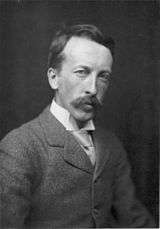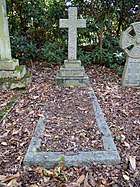William Henry Hadow
| Sir William Henry Hadow MA, CBE, Hon. D Mus | |
|---|---|
 | |
| Vice-Chancellor of the University of Durham | |
|
In office 1916–1918 | |
| Preceded by | The Very Rev'd Prof Henry Gee |
| Succeeded by | John Stapylton Grey Pemberton |
| Vice-Chancellor of the University of Sheffield | |
|
In office 1919–1930 | |
| Preceded by | William Ripper |
| Succeeded by | Arthur Wallace Pickard-Cambridge |
| Personal details | |
| Born | 1859 |
| Died | 1937 |
| Spouse(s) | Edith Troutbeck |
| Alma mater | Worcester College, Oxford |
| Profession | Academic, Educationalist and Vice-Chancellor |
Sir William Henry Hadow CBE (27 December 1859 – 8 April 1937) was a leading educational reformer in Great Britain and a musicologist.
Life
Born at Ebrington in Gloucestershire and baptised there on 29 January 1860 by his father, he was the eldest child of the Reverend William Elliot Hadow (1826-1906) and his wife Mary Lang Cornish (1835-1917).[1] His grandfather, the Reverend William Thomas Hadow, had married Eleanor Ann Bethune, daughter of Colonel John Drinkwater Bethune.[2]
He studied at Malvern College,[3] followed by Worcester College, Oxford, where he taught and became Dean (1889).[4] In 1905, Hadow was elected the first Old Malvernian member of the Council of Malvern College.[5] In 1909, he was appointed principal of Armstrong College in the Newcastle Division of Durham University before succeeding, as Warden and Vice-Chancellor of the University of Durham in 1916. In 1919, he was appointed the Vice-Chancellor of Sheffield University (1919–30).

As chairman of several committees, he published a series of reports on education, notably The Education of the Adolescent (1926) which called for the re-organization of elementary education, the abandonment of all-age schools, and the creation of secondary modern schools. These became known as the Hadow Reports. He was a leading influence in English education at all levels in the 1920s and 1930s.
Hadow wrote a number of publications on music and music theory, including the Oxford History of Music which he wrote and edited. He was a composer. He was also a Member of the Council of the Royal College of Music.
He was awarded a Knight Bachelor in 1918[6] and a CBE in 1920.
In 1930 in London, when he was 70 years old, he married a long-standing friend, Edith Troutbeck (1863-1937), daughter of the musicologist and translator John Troutbeck.[7] She died a few weeks before his own death in Westminster, London. They are buried in Brookwood Cemetery in Surrey.
Publications
- Studies in Modern Music (Berlioz, Schumann and Wagner)(1893) Seeley and Co. Limited, London
- Studies in Modern MusicSecond Series (Chopin, Dvorak and Brahms) (1895) Seeley and Co. Limited, London
- A Croatian Composer. Notes toward the Study of Joseph Haydn (1897) Seeley and Co. Limited, London
- Music (1925) Williams and Norgate Ltd, England
- Collected Essays (1928) Oxford University Press
- English Music (1931) Longmans Green & Co, London
- Beethoven's Opus Eighteen Quartets
- William Byrd 1623-1923 (1920) Humphrey Milford, London
- A Comparison of Poetry and Music (1926) Cambridge University Press
- Sonata form
References
- ↑ Gloucestershire Archives, Gloucester, England, Reference Number:GDR/V1/471 Bishop's Transcript of the baptismal register of Ebrington http://www/ancestry.co.uk/ (subscription required) Retrieved 11 November 2015
- ↑ John Burke 'A Genealogical and Heraldic History of the Commoners of Great Britain and Ireland Enjoying Territorial Possessions Or High Official Rank But Uninvested with Heritable Honours', Colburn, 1836, volume 3, p381 https://books.google.com/ Retrieved 11 November 2015
- ↑ The Malvern Register (1865-1904), 1905
- ↑ "W.H. Hadow's Visit". The New York Times. 15 August 1903.
- ↑ The Council, The Malvern Register (1865-1904), 1904
- ↑ "New Year Honours. The Official Lists., New Peers And Baronets., Long Roll Of Soldiers. (transcription)" (Issue 41675). London: The Times. 1 January 1918. p. 8; col B. Retrieved 24 December 2008.
- ↑ Shera, F. H. (May 2006), "Hadow, Sir (William) Henry (1859–1937)", in David J. Golby, Oxford Dictionary of National Biography, Oxford University Press, retrieved 20 October 2017
External links
| Wikisource has original works written by or about: William Henry Hadow |
- Biography.com entry
- The Hadow Reports: an introduction at InfEd
- Gillard D (2006) The Hadow Reports: an introduction
- "Archival material relating to William Henry Hadow". UK National Archives.

- Free scores by William Henry Hadow at the International Music Score Library Project (IMSLP)
- Works by William Henry Hadow at Project Gutenberg
- Works by or about William Henry Hadow at Internet Archive
| Academic offices | ||
|---|---|---|
| Preceded by The Revd Henry Gee |
Vice-Chancellor & Warden of the University of Durham 1916–1918 |
Succeeded by John Stapylton Grey Pemberton |
| Preceded by William Ripper |
Vice-Chancellor of the University of Sheffield 1919–1930 |
Succeeded by Arthur Wallace Pickard-Cambridge |